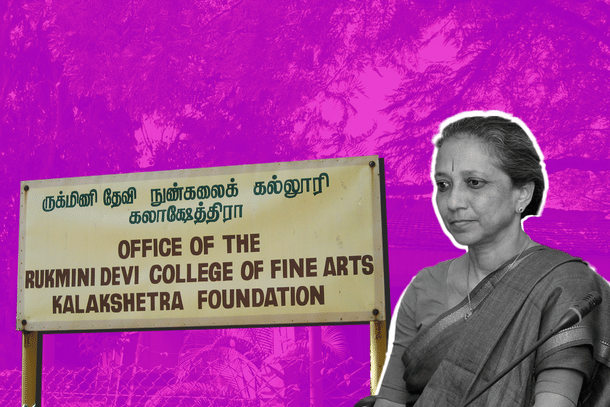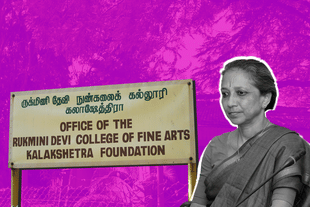Culture
Leela Samson, Kalakshetra, And The Collapse Of Credibility
K Balakumar
Jun 17, 2025, 02:41 PM | Updated 02:41 PM IST
Save & read from anywhere!
Bookmark stories for easy access on any device or the Swarajya app.


The #MeToo movement, which gained momentum in India in 2018, was meant to be a reckoning, one where survivors could speak out against entrenched power structures that had shielded perpetrators for decades. However, as the movement evolved, cracks began to appear.
While some cases led to genuine accountability, others became performative spectacles, where outrage was selectively applied based on ideological leanings rather than sincere pursuit of justice.
The Kalakshetra and Leela Samson controversy is a prime example.
The institution, a Hindu cultural bastion, was rocked by allegations of sexual harassment against faculty member Hari Padman three years back.
The accusations led to student protests, frenzied media scrutiny, and some administrative action. However, despite the uproar, the case against Hari Padman did not progress in court. Not even a charge sheet was filed, and the legal process stalled. The accused is now on bail with no one having much clue about the status of the case.
At the time when the scandal broke in 2022, Leela Samson, a well-known dancer, former Kalakshetra director, and prominent liberal voice, shared on Facebook damning allegations against Hari Padman. Simultaneously, she also mentioned, incorrectly and publicly, the name of a student to be a 'mistress' of the accused. Of course, it was without any corroboration.
This week, in a post laden with belated contrition, she has admitted to having 'erred.' She expressed 'regret' for naming the student, as a part of a legal settlement wherein she is reported to have agreed to pay Rs 8 lakh and issue a public apology. No further legal action will follow. But her regret on Facebook has been done with surreptitious intent as she had removed it from reaching all her followers on the platform.
Leela Samson wasn’t just an ex-employee, she was Kalakshetra royalty. Her words carried weight, legitimacy, and cultural capital. To allege wrongdoing in a Facebook post and name a student, without verifying facts, was an act not just of personal failing but institutional irresponsibility. And the apology, though legally acceptable, cannot rewind the consequences.
The Convenient Blind Spots
The Leela Samson episode is no anomaly. It's emblematic of a wider malaise afflicting the so-called progressive corners: the eagerness to virtue-signal, to posture as saviours of the oppressed, often with scant regard for process or proof. These actions, whether driven by ideological zeal, social media optics, or unchecked moral confidence, end up doing measurable harm. To institutions. To individuals. And most tragically, to the cause they claim to champion.
Hari Padman’s case mirrors, in uncomfortable ways, the 2021 episode at PSBB (Padma Seshadri Bala Bhavan), another iconic Chennai institution with strong Hindu roots. There, too, allegations of sexual misconduct by a teacher erupted on social media. FIRs were filed.
The case initially led to the arrest of the accused, but like Kalakshetra, it failed to move forward in court. The accused has been let go. But by then, the damage was done to the school’s name and to faith in due process.
Contrast this with the case of Vairamuthu, the celebrated Tamil lyricist, who has faced multiple allegations of sexual harassment from 17 women in the music industry, including Chinmayi Sripada, the singer who cannot miss the headlines these days. Despite the sheer number of accusations, no legal action has been taken against Vairamuthu, and he continues to enjoy political patronage and industry support.
The Chief Minister of the State shares stages with him whole industry biggies like Kamal and Rajini flaunt his association as a cherished medal. Stalin spoke in support of the wrestlers’ protest against Brij Bhushan, but has remained silent on Vairamuthu.
For liberals, too, who mobilised overnight for Kalakshetra or PSBB, Vairamuthu remains strangely untouchable. Institutions like Kalakshetra and PSBB, rooted in Hindu tradition and Brahminical lineage, are perhaps seen as ‘fair game.’ They're easier to vilify. Easier to decouple from the politics of power.
But when the accused sits inside the patronage web of Tamil cinema, or wears the badge of progressive politics, the silence is deafening. Vairamuthu remains untouched not because the allegations lack gravity, but because those who scream at temples, whisper around cinema sets, in a manner of speaking.
Activism Without Accountability
What gets lost in such theatrics is the real victim, the genuine survivor. When high-profile accusations unravel, when performative allies jump the gun, and due process is sacrificed at the altar of clout, it creates fertile ground for scepticism.
The next time a young dancer walks into the ICC (Internal Complaints Committee) at Kalakshetra, she may be met with more doubt than dignity. Because someone cried wolf too loudly, too soon.
The #MeToo movement globally was always fraught with a delicate tension, between empowering the hapless victims and safeguarding the rights of the accused. Even if vigilante in spirit, in India, where institutions are weak, it served as a long-overdue corrective. The catharsis was necessary. The naming of the powerful. But when applied without rigour, or selectively, it becomes a blunt weapon.
The thing is movements like #MeToo do not survive on hashtags. They too need credibility. And that credibility is hard-earned, easily lost, and hardest to restore once squandered.
To be clear, none of this is an argument against the #MeToo movement. Quite the opposite. It is a call to protect it from those who misuse it, whether out of zeal or negligence. There are dozens and dozens more where survivors have been denied justice. For every institutional acquittal, there are countless quiet expulsions, where the predator remains protected.
But to preserve the moral high ground, champions of the movement must hold themselves to the same standards they demand from others. If mistakes are made, they must be publicly, unequivocally corrected. Not settled quietly in Facebook apologies and court-mediated payouts.
Meanwhile, the common citizen watches from the sidelines, confused, mistrustful, and increasingly indifferent. That is perhaps the greatest betrayal. The transformation of a people’s movement into a brand-driven, ideologically selective performance piece.
#MeToo began as a cry of truth. But if its loudest ambassadors will not wield it with integrity and consistency, then what remains is not justice, but theatre. And no movement, no matter how noble its origin, can survive being reduced to a stage.





